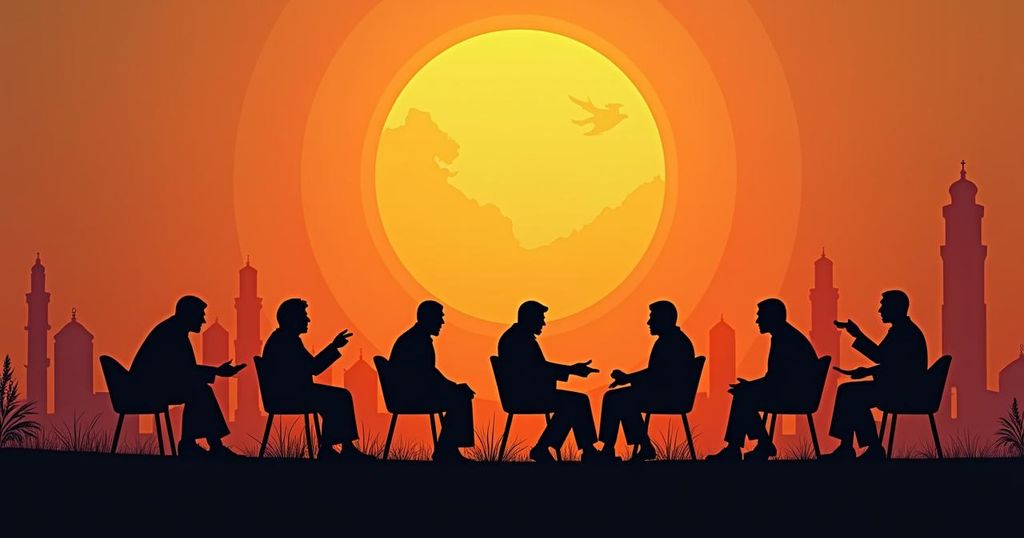Experts analyze the escalating conflict in the Middle East, particularly focusing on Israel’s military objectives in Lebanon and Gaza, the shifting balance of power concerning Iran, and the implications for nuclear aspirations in Iran. The lack of a coherent political strategy for Israel’s actions exacerbates challenges in achieving peace and stability. The influence of future U.S. presidential administrations on these dynamics is also considered, underscoring the necessity for diplomatic engagement to mitigate further conflict.
In the recent escalation of conflict in the Middle East, notably marked by Israel’s ground offensive in southern Lebanon and Iran’s missile attacks, there is growing concern regarding a potential all-out regional conflict. Analysts seek to comprehend the implications of this situation, particularly regarding Israel’s objectives and the broader geopolitical landscape. Israel appears to be shifting its strategy from merely containing Hezbollah to completely neutralizing it. The Israeli government aims to solidify its northern borders while addressing the significant disruption caused to civilian life due to persistent rocket fire from Hezbollah. However, despite considerable military efforts against Hezbollah, complete eradication of the group remains an elusive goal. The ongoing military actions may signal changes in the geopolitical balance of power, with Iranian influence seemingly waning. Nevertheless, any fundamental shifts in the regional status quo will take considerable time. As Israel seeks to capitalize on its tactical victories, the broader implications for international diplomacy remain uncertain. Additionally, the conflict’s implications for Iran’s nuclear ambitions cannot be overlooked. The decline of effective deterrents such as Hamas and Hezbollah has led to an increased push for nuclear development within Iran. The prospect of Israel’s military actions further complicates the already tenuous relationship between the two nations, as Iran perceives any aggression towards its nuclear program as a direct existential threat. The war’s expansion complicates Israel’s military objectives in Gaza, exacerbating tensions among regional populations sympathetic to the Palestinian cause. A lack of a coherent political strategy for post-conflict governance in Gaza may hinder Israel’s ability to achieve sustainable peace. As military actions persist, the quest for a political resolution remains critical to ensuring long-term stability in the region. As the situation evolves, future U.S. presidential administrations may influence Israel’s military strategy significantly. Bipartisan support exists for Israel, yet internal divisions within the American political landscape could lead to varying levels of pressure on the Israeli government. The intricate dynamics of domestic politics in the U.S. will play a crucial role in shaping Israel’s forthcoming military operations and diplomatic maneuvers. Negotiating de-escalation will prove increasingly challenging amidst ongoing hostilities. Achieving consensus on a ceasefire will necessitate significant concessions from all involved parties, particularly regarding Iran’s support for militant groups and Israel’s military strategies. The engagement of major Western powers appears imperative for redirecting military aggression towards more diplomatic channels.
The Middle East has long been a focus of geopolitical tension, particularly between Israel and its neighboring entities. The escalation of conflicts in recent weeks, catalyzed by Hezbollah’s engagement and Iran’s aggressive military posture, has raised alarms of a wider regional conflict. The evolving strategies of both Israel and Iran, as well as the potential impact of U.S. foreign policy, play critical roles in shaping the future stability of the region. A nuanced understanding of the dynamics at play is essential in assessing the likelihood of further escalation or the emergence of peaceful resolutions.
In summary, the current conflict in the Middle East presents a complex and volatile situation, characterized by shifting military objectives and geopolitical implications. Israel’s attempts to neutralize threats on its northern borders must be weighed against the potential for increased regional animosity and the dire need for a political framework to address the Palestinian situation. Diplomatic engagement remains a vital component in pursuing stability, although significant hurdles remain. The international community, particularly the United States, must take an active role in navigating these intricate challenges to avert further escalation and foster a path toward lasting peace.
Original Source: www.bbc.com





